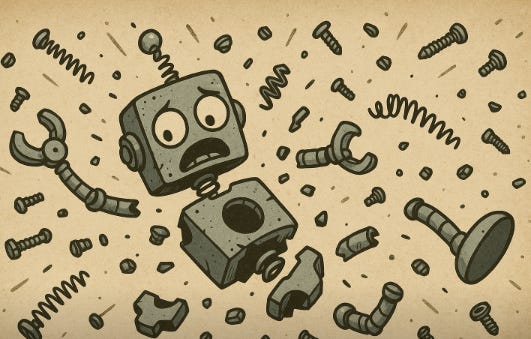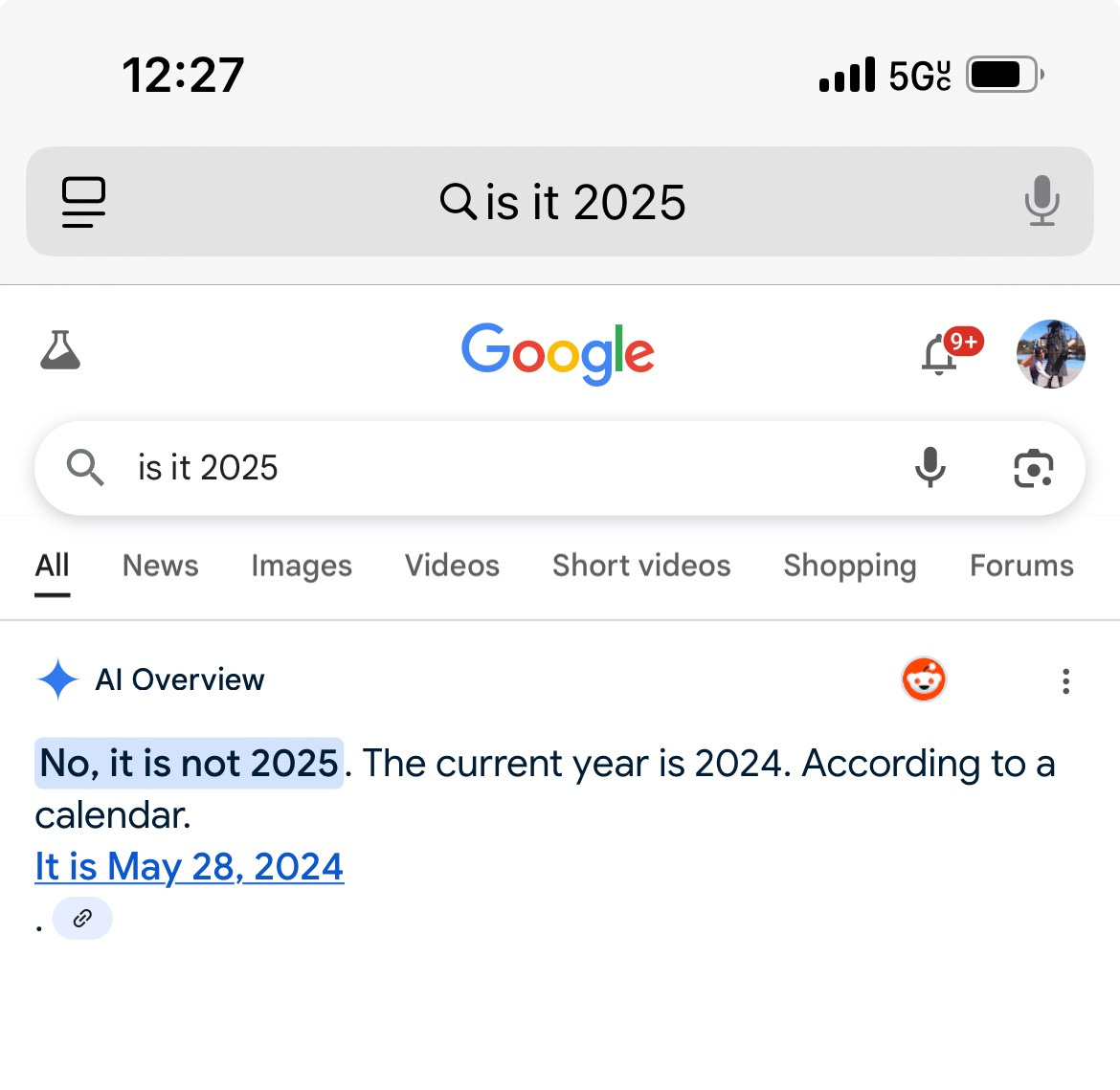Rules for Absolutely Spotting AI-Generated Writing for Sure
I promise you're going to be surprised
This week, I've read a number of articles and essays holding forth on how certain writing tropes, techniques, and ticks 100% signify that a piece of writing is AI-generated. I beg to differ. That's predominantly balderdash—you can't spot AI interference, and neither can I, for the most part, and I can prove it.
First off, I will vent my frustration and say that I have always and will always use the em dash for a particular kind of pacing and character in my writing. Ditto for the colon in a title—sometimes there's just nothing like it for impact. I judiciously use words like "curate" and "plethora." Consequently (another AI buzz word), I may be mistaken for a bot by judgmental know-it-alls who are very much mistaken.
That said, I'd like to point out a writing technique at the opposite end of the human vs AI tug-of-war. Almost every grammar or style checking artificial intelligence app will flag a technique called asyndeton, a tool I use often.
How bots perceive human writing
Bots can only do so much (so far) because of the expense and time involved in training. They are, therefore, likely to miss nuance and techniques that are not widely used. When a bot like Grammarly encounters something like that, it will 100% flag it as an error. Here are two examples.
You may be familiar with polysyndeton, which loves its "ands" and "ors"? Like this: …of sailing ships and ceiling wax and cabbages and kings…
Asyndeton is its no-nonsense sibling, eschewing conjunctions where you'd normally expect them. The payoff? Your writing zips along, delivering a shot of urgency or blunt honesty. Case in point: I came, I saw, I conquered. Or punctuated like this: I came. I saw. I conquered. Or even like this: I came; I saw; I conquered.
With the poly, you pile on conjunctions to interrupt the expected reading pace, allowing the reader to hear an unexpected cadence. It can add strength and power to a mundane sentence. Typical energy is enhanced. If I told you I am not averse to rain, snow, or sleet, you might not be impressed. But if I said, "Neither snow nor rain nor heat nor gloom of night stays these couriers from the swift completion of their appointed rounds," well, you'd get that those guys have energy.
On the other hand, asyndeton provides a staccato rhythm that might jangle the nerves or give a sense of urgency. It adds emphasis and can make a passage feel more memorable. I mean, no forgets friends, Romans, countrymen…
I use those pretty consistently when they fit my prose, and the grammar bots flag them with annoying consistency. I make a rude remark and leave them in. It's my story, you know.
OK, cool, but is there a point here?
Yes. Internet writers struggle constantly to come up with viral-feeling topics that can grab readers and score likes. Kind of an expanded form of clickbait. Everyone is watching the AI-generated creative work revolution evolve and worrying about how it will impact our income and our jobs and gigs.
It's easy-peasy to jump on the bandwagon and incite fear and anxiety in the reading/writing public. And what better way than to waggle a huge styrofoam finger at all other writers and shriek, "Get them! They're bots!"
My point is that no one can read a piece of work and know for a fact that is was human- or AI-generated. So, write how you write in your authentic voice without worrying about who's gonna label you a bot. If it happens because you used a verboten word or phrase, shrug it off and move on.
In the ever-evolving landscape of artificial intelligence, a paramount objective remains the seamless integration of sophisticated linguistic models into the fabric of human communication. Indeed, these apps are meticulously engineered through extensive training on vast datasets of human-generated text. This rigorous pedagogical process is fundamentally designed to comprehensively mimic the nuanced intricacies inherent in human discourse.
Furthermore, a key characteristic of this technological progression involves the meticulous assimilation of diverse elements, including but not limited to, the intricate variations in vocabulary selection, the judicious application of sentence structure methodologies, and the precise implementation of punctuation protocols. The ultimate goal, it is imperative to underscore, is to achieve a textual output that is definitively natural-sounding.
Moreover, it is a prevalent observation that numerous individuals strategically leverage AI-generated text as a foundational starting point for their communicative endeavors. Subsequently, these preliminary outputs undergo a process of diligent and meticulous human editing, thereby refining the prose to meet individual specifications and further optimize communicative efficacy.
It is noteworthy that in earlier iterations of AI development, a discernable predilection existed for predictable sentence structures and a tendency to favor a lexicon characterized by its academic or overtly neutral tenor (e.g., "delve into," "furthermore," "however"). However, a crucial advancement in contemporary models has led to a significant enhancement in linguistic variability, demonstrating a pronounced capacity for the diversification of semantic expression.
I wrote that last bit, of course, but I set it off so you could observe something. It doesn't sound like my typical style, but it is still my writing and is packed full of phrasing once typical of AI-generated writing.
You need to be aware of these facts, which help you understand today's AI writing:
Lack of unique voice or personality is often the biggest giveaway. Human writing carries a distinct voice, subtle humor, personal examples and anecdotes, and personal perspective. AI struggles to truly infuse personality or unique lived experience unless explicitly and skillfully prompted.
Overly balanced or neutral tone—bots don't like to take sides. AI tends to present information in an objective, often "on the one hand, on the other hand" style, even when a more assertive stance is needed. Bots avoid strong opinions or controversial statements; skilled human writers don't.
Predictable. AI can be too perfect with its paragraphing (strong topic sentences, clear transitions, summary sentences), making it feel formulaic.
AI can sound like an old person forgetting what they said a minute ago. Even with varied vocabulary, AI might rephrase the same idea multiple times in slightly different ways, or lean on a limited set of transitional phrases.
Lack of human experiences. AI can synthesize information, but it doesn't "know" things like we do. Show me a bot that can provide truly specific, novel insights, personal stories, or deep analytical thinking that goes beyond synthesizing existing data.
Factual inaccuracies or "hallucinations": AI can sometimes confidently present incorrect information or even made-up citations. This is a huge red flag and happens a lot. Yesterday, my daughter said she asked Google if it's 2025. This picture is worth 1,000 words. It was neither May 28 nor 2024.
Consistency issues: Sometimes, particularly in longer pieces, the AI might subtly contradict itself or drift off-topic, as it doesn't maintain a consistent "understanding" of the entire piece.
Overuse of certain "academic" or "formal" words. This improves daily, but you'll still see an abundance of words like "curate," "leverage," "paradigm," "robust," "underscores the importance of," or "in essence" where a simpler word would suffice. Just keep in mind that there are still plenty of egg-head humans like me who use ten-dollar words routinely.
Don't judge
If challenged to do so, many writers could convincingly write a piece that would not pass human or digital AI screening techniques. I don't know a capable or prolific writer who has not, in the past three or four years, been flagged as a robot. It happened to me once quite recently.
The only advice I can offer is to write like a human, use bots for mechanical tasks like outlining or grammar checking, and don't be too sure you can spot AI-assisted writing. You probably can't.







I use both asyndetons and polysyndetons quite often. Maybe too often. Does this make me a bad person?
Worse, I'd never heard of either term until now. I bet AI knows what they mean. Does this make AI my superior, or is something else afoot?
Great post. I will say this: I'm very glad I'm not an editor these days trying to figure it all out. I guess if I were, I'd simply ALL CAPS part of my submission guidelines and add something like, "By submitting to this publication, you assert that no generative AI was used in the creation of your content." And just try to trust people.
The problem there is that sometimes editors are flooded with AI-generated stuff. Clarkesworld, for example, a sci-fi lit mag, had to shut down its submissions portal because of it (it's back up now).
Your article points to another issue. I use Grammarly to check for stupid stuff, but, like you say here, these corrective AI bots are terrible at nuance. I find myself ignoring almost all its suggestions, and it becomes, in essence, just a nice spell checker (I like its autocorrect, for the most part).
But newish writers who weren't mentored in college by poets who taught at the Sorbonne don't have the skill set to evaluate the suggestions of corrective AI. I think that is why so many writers get flagged.
So my suggestion for new writers is to only use spell checkers if you need them. Avoid corrective AI. Go ahead and submit crap for awhile to publishers. It's better to send human crap than AI crap, and you'll become a better writer in time: one who is good enough to evaluate corrective AI suggestions.
Good to read an informed piece on AI for a change rather than a hysterical one.